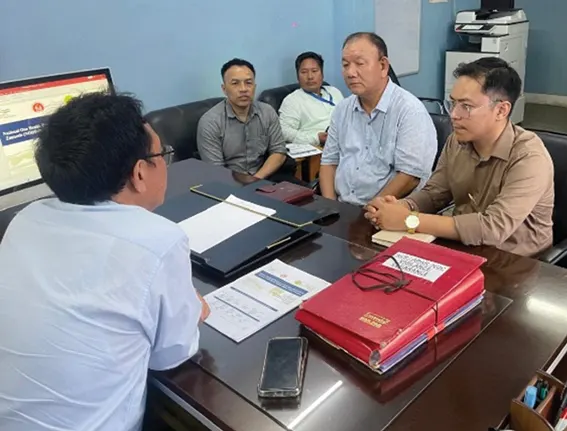NAHARLAGUN, 17 May: Health Services Director Dr Riken Rina convened a meeting at his office here on Friday to assess the preparedness of the health & family welfare department in response to the rising incidents of dog bite in the state.
Rabies has been a notifiable disease in Arunachal Pradesh since 14 February, 2022. All healthcare providers are mandated to report every suspected case of rabies to the higher authorities.
Currently, over 97 percent of animal bite cases in the state receive post-exposure prophylaxis (PEP). The four suspected rabies deaths reported in 2024 occurred in cases where individuals did not seek medical attention and therefore did not receive PEP. “The department has investigated all suspected rabies cases, ensuring that necessary prophylaxis and action have been taken,” the state surveillance unit informed in a release.
It was reaffirmed during the meeting that the intradermal (ID) route of rabies vaccination and the administration of rabies immunoglobulin (RIG) to non-vaccinated Category 3 bite cases, as per the union health & family welfare ministry’s guidelines, must be prescribed by all doctors in the state.
In response to the increasing animal bite cases during the current dog mating season, the department has initiated procurement of anti-rabies vaccine (ARV) and RIG. As of 15 May, 496 vials of ARV and 50 vials of RIG have been supplied to the TRIHMS anti-rabies clinic, and an additional 100 vials of ARV are currently being procured. “Training of trainers for ID vaccination and RIG administration was completed across all districts on 8 March, under the guidance of Dr Omesh Bharati, a pioneer in rabies prevention in India,” the release said.
Integration of cold chain facilities for ARV and ARS with the routine immunisation (RI) cold chain is being explored.
It was noted that the current vaccine procurement and cold chain space are insufficient for all districts due to the programme’s financial constraints. “Support from local MLAs and administration will be sought to address these issues. There are currently three model anti-rabies clinics, at TRIHMS Naharlagun, BPGH Pasighat, and GTGH Ziro, offering free vaccination services,” it added.
The public have been advised to take “every animal bite or scratch seriously.”
“The most crucial step is to wash the wound immediately with running water and soap for not less 15 minutes, then report the case to the nearest health facility and complete their vaccination,” the release stated, adding that “proper sanitation and prevention of garbage accumulation are essential to control the stray dog population.”
“The people are also advised not to panic but maintain caution as rabies is 100 percent preventable,” it said.
The meeting was attended by key officials, including National Rabies Control Programme’s (NRCP) state nodal officer Dr L Jampa, Health Services Director’s OSD Dr R Krishnan, NRCP additional state nodal officer Dr D Taipodia, NRCP consultant Dr B Riram, NRCP veterinary consultant Dr M Mallo, comprehensive primary healthcare additional state nodal officer Dr D Lowang, epidemiologist Dr Tana T, and staff members.



